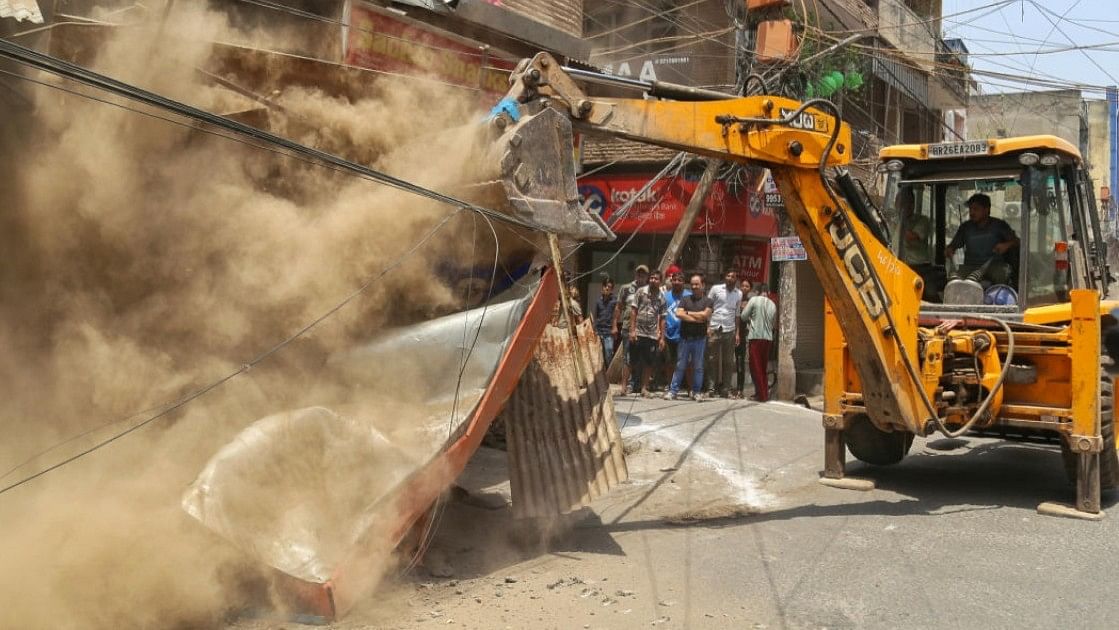
A bulldozer being used to demolish illegal structures. Representative image.
PTI File Photo
New Delhi: The Supreme Court on Tuesday mulled over a judicial oversight, giving mandatory prior notice and adequate time by the authorities before resorting to 'bulldozer justice' as it reserved its judgment on laying down pan India guidelines to curb the tendency of state authorities to demolish house of an accused soon after his name emerged in a criminal case.
A bench of Justices B R Gavai and K V Vishwanathan also clarified whatever guidelines, it would lay down, those would be applicable on all institutions and individuals and not meant for a particular community.
"We are a secular country and our directions will be for all irrespective of religion or community. Of course for encroachments we have said if it is on public road or footpath or water body or railway line area we have clarified. We do not want to save any illegal construction, if there is any religious structure on the middle of the road be it gurudwara or dargah or temple, it cannot obstruct public," the court said.
The court wrapped up its proceedings after hearing arguments from Solicitor General Tushar Mehta and senior advocates A M Singhvi, C U Singh, Sanjay Hegde, and M R Shamshad and advocates Prashant Bhushan and Vrinda Grover and others on behalf of petitioners Jamiat Ulama I Hind and others.
The court also extended its September 17 order prohibiting the use of bulldozer by States for demolition of a property of an accused in a criminal case, without permission of this court, till the judgment is delivered.
The court said for unauthorised constructions, the demolition has to be on law, it is not dependent on religion, faith or belief. It also cited a figure of 4.45 lakh demolitions which took place in recent time.
The court said judicial oversight is required after notices are given by municipal authorities. "One glance by a judicially trained mind is necessary," the bench felt.
"Till municipal authorities decide on those cases, at present, there is not even a quasi judicial oversight," the bench said.
The bench emphasised whether it be temple, dargah on public places, it has to go, public safety is paramount.
The bench found fault with the procedure in cases where there are two structures in violation and action is taken only against one in the background of a criminal offence.
The apex court made it clear that violation of its guidelines regarding demolition will amount to contempt of court, and emphasised that if demolition is found to be illegal then property will have to be restored.
If the demolition is found to be illegal then property will have to be restituted, it said.
With regard to restitution, the bench said, “At least for the family to make some alternative arrangements, 15 days time is required. Suppose they do not want to contest. Even if it is unauthorised it is no happy site to see women and children on the road….after 15 days nothing is going to be lost if demolition is done. What joy, he has built it there will be some spastic child there."
The court also asked Solicitor Mehta, who appeared for Uttar Pradesh, Gujarat and Madhya Pradesh, if criminal background of a person can be ground for demolition of the house.
Mehta said no, this can absolutely no ground for demolition. He said the court may mandate issuance of notice through registered post which may give 10 days time.
He also said the court may not focus on cases hyped by the media. He also said a plea was filed before the National Green Tribunal alleging 7.5 lakh hectare of forest land was under encroachment.
"I am worried about non genuine litigants getting any benefit of the apex court's proposed order," he said, adding there have been instance like Supertech and Maradu, where this court ordered demolitions.
The counsel for the petitioners highlighted the demolition cannot be used as a crime fighting measure.
On September 2, the Supreme Court had said it would lay down pan India guidelines to deal with a controversial issue of "Bulldozer justice" resorted to by some state governments to demolish the house or shop of a person immediately after he or she is accused of an offence.
On September 12, another bench made strong observations against "bulldozer justice", saying in a country where actions of the State are governed by the rule of law, the transgression by a family member cannot lead to demolition of their legally constructed house or it would be equivalent to running bulldozer over the laws.
